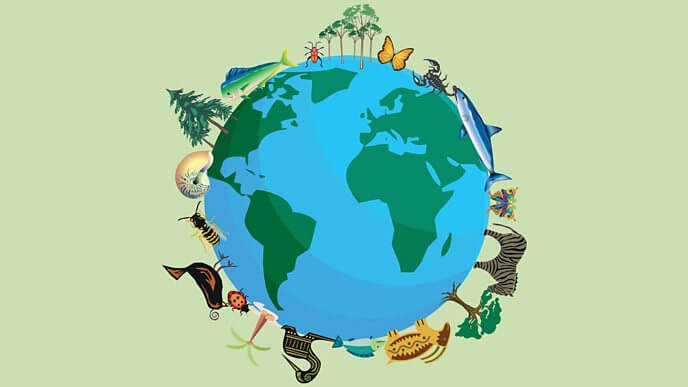The same foods are repeatedly blamed for a decline in biodiversity, but should you remove them from your shopping basket altogether? And if so, is that really enough to solve the problem?
You’ve no doubt heard about how cattle farming and palm oil production have led to deforestation, resulting in damage to biodiversity. But if you want your food shop to have the least possible impact on species diversity, what should you do? Is it best to simply drop a handful of products from your shopping basket – and if so, which ones? Would eating a more varied diet help? Or, for those who can afford it, would only buying foods farmed in a particular way be most effective? We spoke to experts to find out…
Why worry about biodiversity?
“When a species goes extinct, it’s gone forever. Losing species isn’t just deeply sad, it’s also dangerous. It’s like throwing bits of an aeroplane out the window mid-flight – we don’t know what species are crucial parts of a functioning ecosystem. And when ecosystems start unravelling, we all suffer. We rely on nature for literally everything that matters: food, air, water. Our health depends on the planet’s health”, explains Dr Laura Kehoe, a post-doctoral research fellow in ecology at the University of Oxford.
How does food damage biodiversity?
Deforestation is a big part of the problem. “In only 13 years we’ve lost the equivalent of the size of Mexico in wilderness regions. A leading cause of this destruction is the expansion of farms”, says Kehoe.
But there are other factors to consider. “We’re monocropping [growing a single crop year after year on the same land], we’re covering up major centres of biodiversity… we’re altering the climate, we’re changing everything that enables biodiversity to thrive and making it more fragile”, says Tim Lang, Professor of Food Policy at City University of London.
How we produce our food is critical, including our farming practices, the sprays we use and how we manage waste. “A field isn’t just a field, a crop isn’t just to crop, it depends how we grow it, how much we grow, and whether we’re using it in a wasteful way or in a way that is actually feeding us”, continues Professor Lang.
The reduction of variety in foods we eat is an important factor. “We now mainly grow just a handful of crops from a possibility of hundreds”, says Dr Helen Harwatt, a food and climate policy fellow at Harvard University. But she also highlights the dominance of farmed animals: “If we add up the weight of all land mammals, including humans and wild animals, on the planet, farmed cows and pigs alone account for 51 percent). Of all birds, farmed chickens account for 57 percent. We’re essentially pushing out wild animals and native ecosystems, and replacing them with farmed animals and cropland.”
What can we do?
There is no simple solution. “Rich people have lots of choice, poor people have much less, it’s harder for people on low incomes… so the messages have to be different according to people’s circumstances”, says Professor Lang. What does he recommend? “Eat less, eat diverse, buy organic and sustainably produced food wherever possible, and eat a variety of plants.”
Should we give up any foods? “Every food I can think of could be beneficial to biodiversity if it was grown in a way, and eaten in an amount, that’s in balance with nature. This would mean eating a lot less meat and eating foods grown using regenerative farming techniques [techniques that seek to rehabilitate the ecosystem]”, says Dr Kehoe.
But she acknowledges it isn’t all down to the consumer: “Within the food industry I would like to see a very radical transformation. The food processing industry has got to support organic and biodiverse cropping systems. They must simply produce less. And they must phase down and alter animal production.”
Many foods are in the firing line, but here are some of those often associated with impacting biodiversity.
Read the rest of the article here: https://www.bbc.co.uk/food/articles/biodiversity
